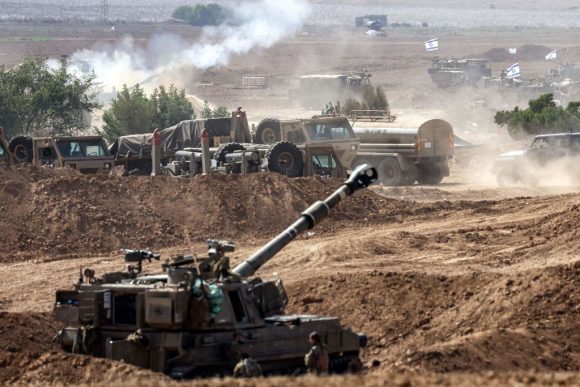
Near the Israeli border with Gaza, Oct. 12, 2023. (Jack Guez/AFP)
On Oct. 7, the Palestinian militant group Hamas launched an attack on Israel at the Israeli music festival Supernova, a weekend long electronic dance music festival, held near the Gaza Strip. Hamas killed 260 festival goers in the unprecedented attack and claimed to have taken several hostages.
For many at the University of Colorado Boulder, the attack, as well as the subsequently declared war between Israel and Hamas, is a reminder of more than 75 years of conflict that has taken lives on both sides — although most fall on the Palestinian side of the border.
[expand title=”Click here for a brief history on the conflict“]
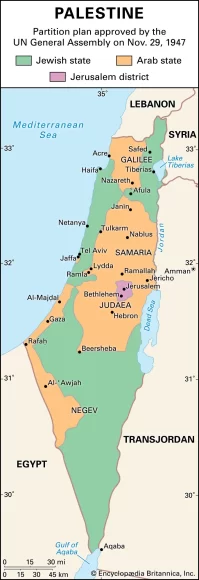
UN partition plan for Israel and Palestine in 1947. (Courtesy of Encyclopædia Britannica)
From 1917 to 1947, the state of Palestine resided under British Mandate, meaning the British government was responsible for governing and overseeing development. In 1947, the United Nations voted to adopt Resolution 181, commonly known as the Partition Plan for Palestine. This resolution aimed to divide the territory into Arab and Jewish states and the city of Jerusalem to be placed under an International Trustee System.
The adoption of this resolution incited the Arab-Israeli War of 1948, the first of many conflicts, and resulted in the division of the territory, creating three regions: the State of Israel, the West Bank and the Gaza Strip.
Israel has seen conflict in and around its borders since its establishment in 1948. In 2006, conflict ramped up when Hamas won the Palestinian Authority’s parliamentary elections. Many Western governments, including the United States, Canada and the European Union, consider Hamas to be a terrorist organization.
Hamas has been restrictive in their governing, establishing authoritarian institutions, according to the Council on Foreign Relations. Hamas has also repressed Gazan media and has limited political opposition. Additionally, Palestinans have not voted for a legislature since Hamas won the parliamentary elections in 2006.
In response to the Oct. 7 Supernova attack, the Israeli Defense Force has retaliated with a large-scale force and has been supported by the U.S. Government in war efforts.
Since Hamas attacked Israel earlier this month, the situation has resulted in a significant loss of life. According to the Palestinian Ministry of Health, there have been over 2,600 reported Palestinian deaths in Gaza. The IDF has reported more than 1,400 Israeli deaths. Additionally, the State Department has confirmed that 30 U.S. citizens have lost their lives in Israel during these events.
The United Nations Secretary General, António Guterres, wrote in a statement released on Oct. 9 that the death tolls from the conflict are expected to continue to rise.
[/expand]
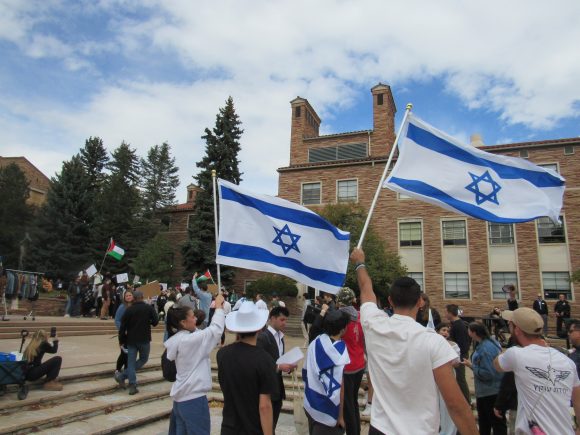
Students fly both Israeli and Palestinian flags outside the University Memorial Center on Oct. 12, 2023. (Jessi Sachs/CU Independent)
Response by students on campus
In the week following Hamas’ initial attack on Israel, students and organizations took to campus to address the conflict.
On Oct. 9, the university’s Hillel and Chabad organizations hosted a solidarity gathering for Israel.
“I’m usually a man of many words, but not today,” said Rabbi Yisroel Wilhelm of Chabad. “Today, I cry and I weep for the worst day in Jewish history in two generations.”
A spokesperson for Hamas’ military wing, the Al-Qassam Brigades, reported Hamas took an estimated 200 to 250 hostages from Israel to be held in the Gaza Strip, in addition to over 1,400 casualties.
The gathering largely focused on uplifting students across campus and creating a sense of community through prayers and music.
“I really wanted to bring everybody here so they can show each other, [that] they’re supporting each other,” said Omer Hart, a Jewish student born and raised in Israel that spoke at the gathering. “It’s important to be together in this time…and it really warms my heart to see everybody here together for each other.”
While the gathering touched on the political context and history behind the attacks, it primarily focused on the effects on Israeli citizens, as well as the impacts on Jewish and Palestinian students on campus.
“I don’t want any political events. I don’t want any protests. I don’t want any discussion. I just want people to pray and love each other and be there for people who lost their lives,” Hart said. “I know a lot of people in Israel, I know a lot of people who know people in Palestine that are suffering. I just want everybody to come together as a school and support each other and show love to each other.”
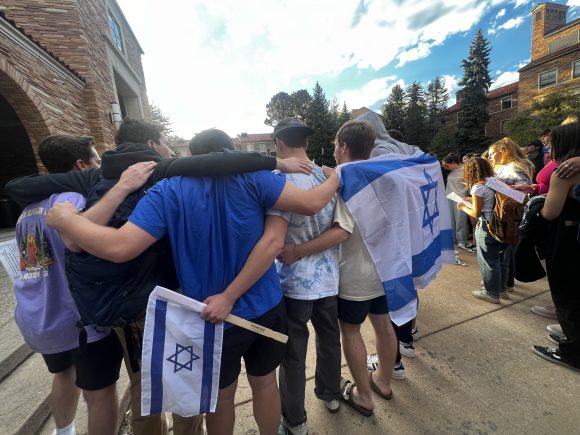
Students wrap their arms around each other while praying at the solidarity gathering for Israel outside the University Memorial center on Oct. 9, 2023. (Lucy Adlen/CU Independent)
Three days later, on Oct. 12, the CU Boulder chapter of Students for Justice in Palestine organized a day of resistance event to show support for Palestine.
Students marched across campus chanting “end the occupation” and “from the river to the sea, Palestine will be free” in hopes of spreading awareness of the issues that have historically faced Palestinians and contributed to the Hamas attacks on Israel.
“If the Western media had been showing the Palestinian perspective, from a long time ago, I feel like this entire story would be like going in a completely different direction,” said Obayda Zuraiqi, a Palestinian student that attended the event.
Other students echoed Zuraiqi’s call for increased attention to the conflict’s impact on Palestinians.
“We’ve been experiencing that [violence] for 70 years… thousands and thousands are without food and water and electricity,” said a student who requested anonymity after their friend, Reema Wahdan, discovered a bullet had been fired through her home in Denver and has faced threats to her business. “You know, it’s not as if that [violence] has ever stopped and it’s just going to intensify, but no one seemed to care that much before this, so it just seems that there’s kind of an imbalance of concern.”
The student, who had a stray bullet from Israeli forces hit them in the leg in 2017 while protesting the implementation of metal detectors at the Al-Aqsa Mosque in Jerusalem’s Old City, said it is hard to hear about the conditions Palestinians face.
“We’re being bombed and we’re losing their signal and their connection and it’s horrifying,” they said. “It’s just these people, these people you love that are the bravest, kindest people in the world: gunned down like animals.”
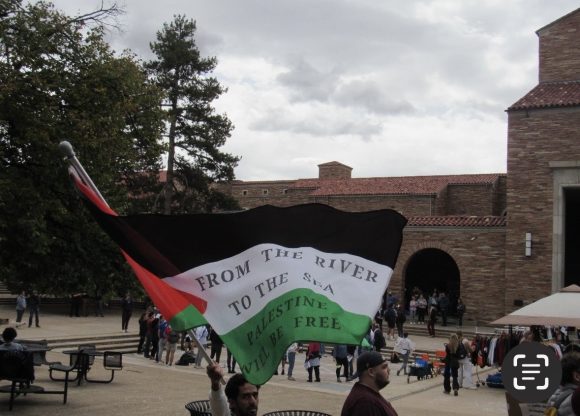
Student waves a flag with the words “From the river to the sea, Palestine must be free” at the Oct. 12, 2023 day of resistance event outside the University Memorial Center. (Lucy Adlen/CU Independent)
Impacts on student life
“Are you going to class today?” asked Avi Yelshevitz, while at a campus gathering to show support for Israel on Oct. 12.
“No, I’m calling my family in Israel,” said Noa Greene, a Jewish student at the university.
For Greene, the conflict has left her struggling to find a sense of normalcy in her daily life. Greene, Zuraiqui and others on campus with family and friends living in Israel, Gaza and the West Bank, share in this sentiment.
“Everyone has to worry about someone back home,” said Zuraiqi, who has family still in the region. “It is a very unstable area, from both sides of this.”
As the conflict continues and the numbers of those dead, injured or missing increase, many students on campus are left with unanswered questions about the statuses of their loved ones.
“As of right now, I don’t actually know what their status is,” Zuraiqi said of his family. “It does, you know, keep a hole in my heart.”
For many, the toll of worrying disrupts their daily lives as students at CU Boulder.
“It’s impossible to focus. I’m on WhatsApp all the time, I’m on social media all the time,” Greene said.
Yet the mental toll on students often reaches beyond concerns for loved ones overseas, as students worry for themselves and others on campus facing antisemitism or anti-Palestinian sentiments in the wake of the conflict.
“I think it’s heartbreaking, disturbing, unsettling. There’s so many conflicting emotions that are just consuming your mind, body and soul and it’s impossible to not be on edge and be looking over your shoulder,” Greene said. “It’s a scary time to be both Palestinian, Arab, Muslim, part of the Jewish community, really just any ties to the destruction that’s happening.”
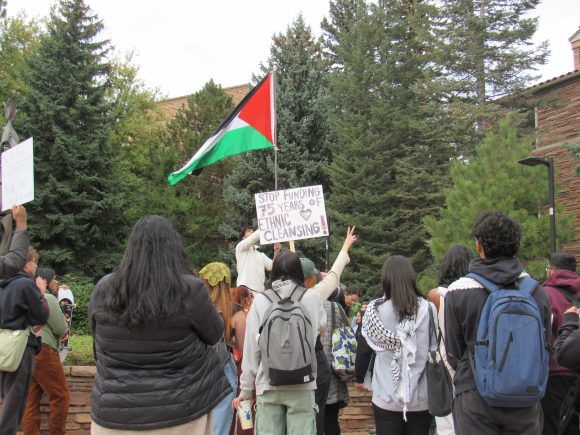
Students hold homemade signs and peace hand signs at the Oct. 12, 2023 day of resistance event outside the University Memorial Center. (Jessi Sachs/CU Independent)
Concerns for hatred and violence on campus
Antisemitic, anti-Arab and anti-Islamic hate crimes in the U.S. have significantly increased in the U.S. over the past 20 years.
Students and faculty have expressed a concern about an increase in antisemitism, anti-Islam and anti-Arab sentiments both on and off campus.
“I think we always have to be aware that when conflict happens, that it doesn’t stay contained,” said Michael English, the director of the Peace, Conflict and Security program at CU Boulder.
English, who holds a doctorate in conflict analysis and resolution, expressed the importance of listening to the experiences of others to limit hate on campus.
“If you are concerned about what’s going on in campus, and you are concerned that people may be being treated unfairly, or being marginalized in some way, the first thing you can do is listen and ask them what it is we can do to support them,” English said.
Professor Hilary Kalisman, assistant professor of history and endowed professor of Israel and Palestine studies within the Program in Jewish Studies, also said discussion in the classroom plays an important role regarding this material.
“At CU Boulder, classrooms are meant to be a place where students learn, and where it should be safe for students to learn and to discuss what they are learning without fear for their personal safety,” she wrote in a statement to the CU Independent.
Students who have experienced discrimination, feel unsafe or have concerns of bias can reach out to the Office of Victim Assistance and the Office of Institutional Equity and Compliance.
The International Affairs department, PACS program and Jewish Studies program all offer classes that can help students gain a deeper understanding of various aspects relating to the conflict between Israel and Palestine.
“Taking a class on the subject is very different from reading about it on social media or major news outlets,” Kalisman wrote. “You can learn much more about the region and its people by reading and discussing them over a semester than by looking at a few sentences online.”
The university issued a statement on Oct. 11 to students and faculty addressing the conflict and promoting respectful discussion of the topic on campus.
“We stand against all acts of violence and human suffering, and recognize the profound effects of the crisis on people living in the region, as well as Israeli and Palestinian scholars and students here in Colorado and around the world,” the statement read. “As an institution of higher education, we will continue to promote free, open and thoughtful dialogue and academic expertise on this decades-old conflict.”
As for students on campus, English advises students to keep an open mind and continue to support each other.
“What I want people to realize, [is that] it’s okay to not have an opinion. It’s okay to be confused,” English said. “A lot of it just starts with being attentive to other people and their needs and feelings.”
Contact CU Independent News Editor Jessi Sachs at jessica.sachs@colorado.edu.
Contact CU Independent Special Issues Editor Lucy Adlen at lucy.adlen@colorado.edu.
